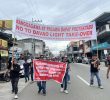DAVAO CITY, Philippines – The expanded free education for Filipino students would be implemented this coming school year in all government-ran schools.
The program, Republic Act 10931 otherwise known as Universal Access to Quality Tertiary Education Act, would now cover free college education. The previous program covers only elementary and high schools in all public schools.
The Commission on Higher Education (CHED) XI and the Office of the Unified Financial Assistance System for Tertiary Education (UniFAST) conducted its first regional information caravan at the University of Southeastern Philippines (USEP) on May 2, Wednesday, to brief participants on the implementing rules and regulations.
The RA 10931 was signed into law by President Rodrigo Roa Duterte on August 3 last year with an allocation of P40 billion for fiscal year 2018 to cover the cost of tertiary education for all Filipino students enrolled in government schools.
The benefits for the free higher education include tuition fee for all subjects, courses, or classes and free miscellaneous and other school fees.
Also, Tertiary Education Subsidy (TES) and Student Loan Program (SLP) are included that would assist in finishing the student’s course.
According to the law, students enrolled to private schools and Technical-Vocational Institutions may avail of the subsidy and student loan program.
Atty. Carmelita Yadao-Sison, acting executive director of UniFAST, said the program would apply only to those with first undergraduate course.
“There are no financial and age requirement, as long as it is your first undergraduate course,” she said.
The Free Technical and Vocational Education and Training (TVET) has also been made part of the components under RA 10931. Dir. Gaspar Gayona, regional director of Technical Education Skills Development Authority (TESDA) XI, said TVET includes free training and training-related expenses such as living allowance, starter toolkit and cost of accreditation.
Meanwhile, student group National Union of Students of the Philippines (NUSP) slammed the law’s IRR as it “does not expand access” to free education in public.
“Instead of genuinely making education free by abolishing tuition and other school fees altogether, the Duterte government upholds the collection of fees from students in state universities and colleges (SUCs),” it said in a previous statement.
The group also criticized the TES and SLP as “schemes for the private sector to tap into public funds”. NUSP said it serves the interest of the capitalist educators by preventing the exodus of students from private to SUCs and added that public funds must be channeled to SUCs to accommodate more beneficiaries.
CHED said there are six recognized state universities and colleges in Davao region. These are the University of the Philippines Mindanao and University of Southeastern Philippines in Davao City, Davao del Norte State College, Davao Oriental State College, Compostela Valley State College, and Southern Philippines Agri-Business and Marine and Acquatic School of Technology in Davao del Sur.
There are four local colleges run by the local government units: Kapalong College, Kolehiyo ng Pantukan, Monkayo College of Arts, Sciences, and Technology, Governor Genero College of Arts, Sciences, and Technology. (davaotoday.com)









